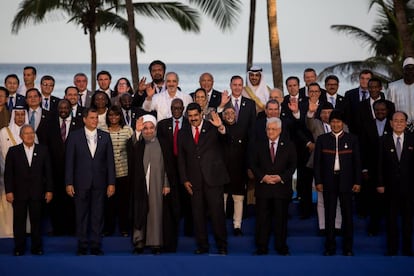Non-Aligned Movement summit in Venezuela overshadowed by crisis
Government locks down host island of Isla Margarita for conference accused of promoting authoritarianism

Venezuela has closed out its hosting of the latest summit of the Cold War-era Non-Aligned Movement (NAM) bloc under heavy criticism.
Poor attendance by foreign dignitaries, accusations of wasteful spending and widespread protests across the troubled nation dogged the five-day event, which finished on Sunday.
Just 15 heads of state from the 120-member bloc bothered to attend the summit, held on the Caribbean island of Isla Margarita, 30 kilometers off Venezuela’s northeast coast, to mark the country’s takeover of the movement’s rotating presidency. The presence of figures including the president of Zimbabwe, Robert Mugabe, and Cuban leader Raúl Castro, also led opponents to slate the five-day summit as a forum promoting authoritarianism.
Forces opposed to Maduro are now pushing for a recall referendum in a bid to topple Maduro
Meanwhile, members of the Venezuelan Democratic Unity Roundtable (MUD) opposition coalition roundly condemned Venezuelan President Nicolás Maduro for spending a figure estimated at between $150 million and $250 million on the summit at a time when the country is experiencing shortages of food and medical supplies.
Isla Margarita, a popular vacation destination, was put into a state of virtual lock-down during the event, with around 14,000 security personnel on duty.
Private planes and drones were prohibited during the conference, while local people were banned from carrying arms. In the lead-up to the summit, buildings were repainted and anti-government graffiti covered up, while food was shipped in as the Venezuelan authorities attempted to spruce up the island, which has been even harder hit by shortages of essential supplies than the mainland.
A visit by Maduro to Margarita Island two weeks ago was marred by noisy protests
But the state of siege on an island, dubbed the Pearl of the Caribbean, was not limited to the NAM summit. Just two weeks before the meeting, a visit by Maduro to Margarita Island was marred by noisy protests which saw the hugely unpopular president – his approval rating is currently at 11% – harassed by angry locals.
Around 30 protesters were arrested, including the Chilean-Venezuelan editor of the online newspaper Reporte Confidencial Braulio Jatar, which posted video footage of the incident online.
Jatar has now been released, but his arrest led to diplomatic tensions between Chile and Venezuela.
Homage to Chávez
The Venezuelan Government marked the beginning of the NAM summit on Friday by unveiling a 3.8-meter-high bronze-plated statute of deceased former president Hugo Chávez on Isla Margarita.
On the same day there were also nationwide protests throughout Venezuela as opposition forces continued to push for a recall referendum against Maduro.
The majority of Venezuelans voted for the opposition in the December 6, 2015 parliamentary elections, thus giving it full control of the National Assembly.
Forces opposed to Maduro are now pushing for a recall referendum in a bid to topple Maduro – a process that would first require the collection of the signatures of 20% of eligible voters within a three-day period.
If that referendum takes place on or before January 10, 2017, and Maduro loses the vote, new elections will be held. If, however, the referendum is held after that date and pro-MUD forces win the vote, Maduro will be simply replaced by current Vice President Aristóbulo Istúriz, who will remain in power until new general elections in 2019.
English version by George Mills.
Tu suscripción se está usando en otro dispositivo
¿Quieres añadir otro usuario a tu suscripción?
Si continúas leyendo en este dispositivo, no se podrá leer en el otro.
FlechaTu suscripción se está usando en otro dispositivo y solo puedes acceder a EL PAÍS desde un dispositivo a la vez.
Si quieres compartir tu cuenta, cambia tu suscripción a la modalidad Premium, así podrás añadir otro usuario. Cada uno accederá con su propia cuenta de email, lo que os permitirá personalizar vuestra experiencia en EL PAÍS.
¿Tienes una suscripción de empresa? Accede aquí para contratar más cuentas.
En el caso de no saber quién está usando tu cuenta, te recomendamos cambiar tu contraseña aquí.
Si decides continuar compartiendo tu cuenta, este mensaje se mostrará en tu dispositivo y en el de la otra persona que está usando tu cuenta de forma indefinida, afectando a tu experiencia de lectura. Puedes consultar aquí los términos y condiciones de la suscripción digital.









































